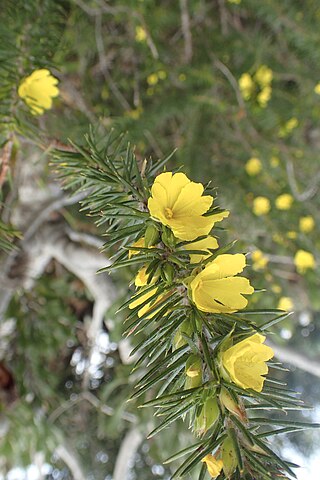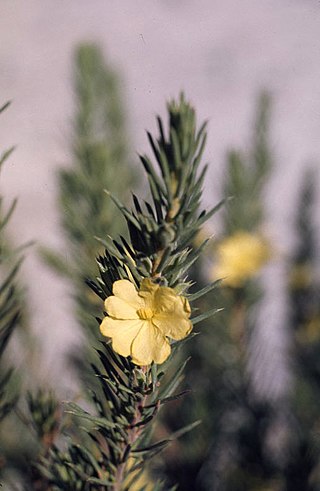
Hibbertia ancistrotricha is a species of flowering plant in the family Dilleniaceae and is endemic to the south-west of Western Australia. It is a shrub with narrow oblong to linear leaves and bright yellow flowers arranged singly in leaf axils with about ten stamens fused at their bases on one side of the carpels.
Hibbertia arcuata is a species of flowering plant in the family Dilleniaceae and is endemic to Western Australia. It is an erect shrub with spirally arranged, narrow oblong to narrow elliptic leaves and golden yellow flowers arranged singly in leaf axils with fifteen to twenty-eight stamens arranged around the two carpels.

Hibbertia avonensis is a species of flowering plant in the family Dilleniaceae and is endemic to the south-west of Western Australia. It is a shrub with narrow oblong leaves and bright yellow flowers arranged singly in leaf axils with about ten stamens fused at their bases on one side of the two carpels.
Hibbertia axillibarba is a species of flowering plant in the family Dilleniaceae and is endemic to a restricted area of the south-west of Western Australia. It is a shrub with crowded narrow oblong to linear leaves. Its yellow flowers are arranged singly on short side shoots with ten or eleven stamens fused at their bases on one side of the two densely hairy carpels.
Hibbertia carinata is a species of flowering plant in the family Dilleniaceae and is endemic to the south-west of Western Australia. It is a shrub with crowded linear leaves and yellow flowers with nine to eleven stamens fused at their bases on one side of the two densely hairy carpels.
Hibbertia charlesii is a species of flowering plant in the family Dilleniaceae and is endemic to a restricted part of the south-west of Western Australia. It is a spreading shrub with crowded, upward-pointing linear leaves and golden yellow flowers with five stamens fused at their bases and up to twenty staminodes, all on one side of two densely hairy carpels.

Hibbertia ferruginea is a species of flowering plant in the family Dilleniaceae and is endemic to the south-west of Western Australia. It is an erect or spreading shrub with linear, sessile leaves and yellow flowers borne in leaf axils near the ends of branchlets with fifteen stamens in five groups surrounding the five carpels.

Hibbertia glabrisepala is a species of flowering plant in the family Dilleniaceae and is endemic to the south-west of Western Australia. It is an erect to sprawling shrub with linear to narrow oblong leaves and bright yellow flowers borne on the ends of short side shoots, with fifteen stamens in groups surrounding the five carpels.
Hibbertia graniticola is a species of flowering plant in the family Dilleniaceae and is endemic to the south-west of Western Australia. It is a shrub with thick, linear leaves and yellow flowers borne singly on the ends of branchlets, with seventeen to thirty stamens arranged around the two or three carpels.

Hibbertia hamulosa is a species of flowering plant in the family Dilleniaceae and is endemic to the south coast of Western Australia. It is a shrub with somewhat crowded, thick, linear leaves and golden yellow flowers with five to eight stamens fused at their bases, all on one side of two densely hairy carpels.

Hibbertia hibbertioides is a species of flowering plant in the family Dilleniaceae and is endemic to near-coastal areas of south-western Western Australia. It is a small, prostrate or sprawling shrub with crowded, linear cylindrical leaves and yellow flowers with usually eleven stamens arranged in groups around three carpels.
Hibbertia lepidocalyx is a species of flowering plant in the family Dilleniaceae and is endemic to Western Australia. It is a shrub with thick, linear, cylindrical leaves and yellow flowers with nine or ten stamens in a single group on one side of the two carpels.

Hibbertia mucronata is a species of flowering plant in the family Dilleniaceae and is endemic to the south of Western Australia. It is an erect shrub with hairy branches, crowded, thick, tapering linear leaves ending in a sharp point, and golden yellow flowers with five stamens fused at their bases, all on one side of two densely hairy carpels.

Hibbertia oligantha is a species of flowering plant in the family Dilleniaceae and is endemic to the south-west of Western Australia. It is a shrub with linear leaves and yellow flowers with six to ten stamens on one side of two glabrous carpels.
Hibbertia pachyphylla is a species of flowering plant in the family Dilleniaceae and is endemic to Western Australia. It is a shrub with thick, oblong leaves and yellow flowers with five stamens in a bundle on one side of two hairy carpels.

Hibbertia priceana is a species of flowering plant in the family Dilleniaceae and is endemic to the south-west of Western Australia. It is a dwarf, usually compact shrub with erect, narrow elliptic leaves and bright yellow flowers with eleven stamens, nine in three groups of three, around three glabrous carpels.
Hibbertia psilocarpa is a species of flowering plant in the family Dilleniaceae and is endemic to the south-west of Western Australia. It is a shrub with spirally arranged, narrow oblong to linear leaves and yellow flowers usually with four to eight stamens, all on one side two glabrous carpels.

Hibbertia rupicola is a species of flowering plant in the family Dilleniaceae and is endemic to the south-west of Western Australia. It is a shrub with densely-clustered, linear leaves and yellow flowers with nine to seventeen stamens arranged around three glabrous carpels.
Hibbertia stenophylla is a species of flowering plant in the family Dilleniaceae and is endemic to Western Australia. It is a shrub with thick, linear to cylindrical leaves and yellow flowers with ten stamens in a single group on one side of two densely hairy carpels.
Hibbertia turleyana is a species of flowering plant in the family Dilleniaceae and is endemic to a small area in the south of Western Australia. It is a low-lying shrub with more or less glabrous, linear leaves and bright yellow flowers with eight or nine stamens in a single group on one side of two densely hairy carpels.










